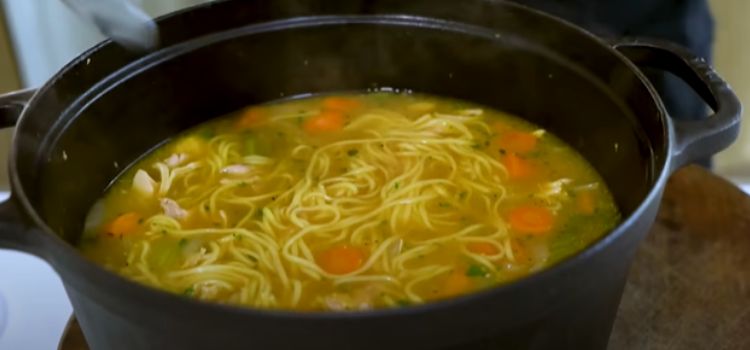As an Amazon Associate I earn from qualifying purchases.
When it comes to post-operative care after wisdom teeth removal, choosing the right foods to eat can significantly impact your recovery process. Among the various options available, chicken noodle soup stands out as a popular choice due to its comforting and nourishing qualities.

In this article, we will delve into why chicken noodle soup is a great option after wisdom teeth removal and explore its benefits, nutritional value, and tips for making the most of this soothing dish.
Introduction
Wisdom teeth removal is a common dental procedure that often requires careful aftercare. One crucial aspect of recovery is selecting foods that are gentle on the healing areas, minimizing discomfort, and promoting healing. Among the various food options, chicken noodle soup has gained popularity for its potential benefits during this recovery period.
Is chicken noodle soup good after wisdom teeth removal
After the removal of wisdom teeth, the gums and jaw may experience inflammation and sensitivity. It’s essential to choose foods that are easy to chew, swallow, and digest. Proper nutrition is vital for supporting the body’s healing process and maintaining energy levels.
Why Chicken Noodle Soup?
Chicken noodle soup is often recommended after wisdom teeth removal due to its numerous advantages. This warm and savory dish provides comfort, hydration, and essential nutrients that aid in recovery.
Nutritional Benefits
Chicken noodle soup is packed with nutrients that contribute to overall wellness and healing. The combination of chicken, vegetables, and noodles provides a balanced blend of protein, vitamins, and minerals necessary for the body’s recovery process.
Easy-to-Eat and Digestible
The soft noodles in chicken noodle soup are easy to chew and gentle on tender gums. This quality makes the dish particularly suitable for individuals who might experience discomfort while eating harder foods.
Hydration and Electrolyte Balance
Maintaining proper hydration is crucial after wisdom teeth removal. The broth in chicken noodle soup not only helps keep you hydrated but also replenishes essential electrolytes lost during the recovery process.
Promotes Healing and Reduces Inflammation
Chicken noodle soup contains important nutrients like vitamins A and C, which are known for their roles in tissue repair and reducing inflammation. These properties can contribute to a smoother healing process.
A Plus for Tender Gums
The ingredients in chicken noodle soup are soft and easy to mash, minimizing the need for excessive chewing. This characteristic is especially beneficial for individuals who need to avoid putting pressure on their healing gum areas.
Homemade vs. Store-Bought Soup
While both homemade and store-bought chicken noodle soups can be suitable options, homemade soup allows you to control the ingredients and tailor the flavor to your liking. Store-bought options might contain higher levels of sodium, so reading labels is important.
Other Soft Food Alternatives
If you’re looking for more variety in your post-wisdom teeth removal diet, consider trying other soft foods such as yoghurt, mashed potatoes, smoothies, and oatmeal. These options provide nutrients while being gentle on your healing gums.
Conclusion
Chicken noodle soup can be an excellent choice for a soft and nourishing diet after wisdom teeth removal. Its nutritional benefits, easy-to-chew components, and potential to aid in the healing process make it a popular option. Remember to prioritize hydration and proper nutrition to ensure a smooth recovery.
Frequently Asked Questions (FAQs)
Yes, you can definitely enjoy chicken noodle soup shortly after your surgery. Its soft and easily chewable components make it a suitable choice for post-operative meals. The warmth and nutrients in the soup can provide comfort and nourishment during the initial stages of your recovery.
While not mandatory, making homemade chicken noodle soup offers certain advantages. Creating your own soup gives you control over the ingredients and flavors, ensuring a nutritious and tailored option. However, if you prefer the convenience of store-bought soup, just remember to check labels for sodium content and potential allergens.
Typically, it’s recommended to consume soft and easily digestible foods for the first few days following your surgery. Chicken noodle soup can be a great choice during this initial phase. You might enjoy it for about 3-5 days or until you feel comfortable transitioning to more solid foods as your healing progresses.
When selecting store-bought chicken noodle soup, be cautious of high sodium levels. Excess sodium might lead to discomfort or hinder the healing process. Additionally, be on the lookout for artificial additives or preservatives that could potentially impact your recovery. Checking the ingredient label can help you make an informed decision.
Absolutely! Adding extra vegetables to your chicken noodle soup is a wonderful idea. Vegetables like carrots, celery, and peas not only enhance the flavor but also increase the nutritional value of the soup. These veggies provide essential vitamins, minerals, and fiber, all of which contribute to your overall well-being and support the healing process. To ensure easy chewing and digestion, make sure the vegetables are cooked to a soft consistency.
Amazon and the Amazon logo are trademarks of Amazon.com, Inc, or its affiliates.